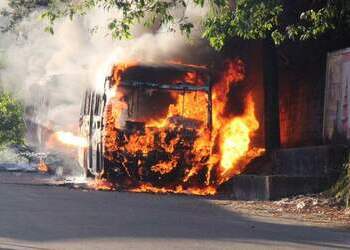Manaus, the economic heart of Brazil’s Amazon, has come under siege from the Red Command gang after the killing of a top drug leader. But these attacks may be the latest chapter in an escalating nationwide criminal war.
On June 7, the city of Manaus weathered dozens of attacks as gang members believed to belong to the Red Command (Comando Vermelho – CV) threw petrol bombs at banks, government buildings, public buses and private vehicles. The government ordered schools and all public transportation to shut down while many businesses similarly closed.
The ire of the Red Command came after one of its leaders in the Amazon region, Erick Batista, alias “Dadinho,” was killed by police near Manaus on June 5.
The violence was “motivated by the death of a trafficker known as Dadinho and intelligence showed that the order [for the violence] came from within prisons,” said the secretary of public security for Amazonas state, Louismar Bonates, at a press conference.
SEE ALSO: Rage, Rinse, Repeat – The Futile Cycle of Anger at Rio’s Police
However, a letter reportedly sent by the CV to the press provided a different version of events. In it, the gang alleged that Batista and Bonates knew each other and that a pact between police and the CV had been reached.
The letter accused Bonates of being a part of a militia-like organization within Amazonas’ military police. The group alleged that Bonates met with Batista 40 days before his death, demanding the gang member pay him a bribe of 600,000 reais ($120,000) in cash, as well as a quantity of gold. It also listed a number of alleged criminal acts involving Bonates, including bribery, extortion and drug trafficking.
InSight Crime has not independently corroborated the contents of the letter and Bonates has never been charged with any crime.
Militia organizations are on the ascendancy in Brazil’s criminal landscape. With their presence most strongly felt in Rio de Janeiro, they are largely made up of former and active police officers, firefighters and prison guards, and enjoy a strong measure of political protection.
InSight Crime Analysis
Manaus regularly sees shocking outbreaks of violence on its streets and inside prisons as the city is crucial to lucrative criminal economies, including drug trafficking, gold mining and contraband, stretching across Brazil, Colombia and Venezuela.
But the theory that the killing of Batista was part of a broader campaign waged by militia groups and police allies on the CV is credible.
In May, a police operation in the Rio de Janeiro favela of Jacarezinho, controlled by the CV, left at least 28 people dead. At the time, it was suggested that the raid may have been a cover to weaken the CV’s grip in Jacarezinho and give militia groups a way in.
“It’s difficult to prove that the operation was deliberately conducted to benefit the militias. But it does benefit them, and if in a few months, Jacarezinho becomes militia territory, we should look back to this massacre as an important step,” Benjamin Lessing, an expert on Brazilian organized crime at the University of Chicago, told InSight Crime.
And in a Twitter thread, Lessing explained that Bonates, Amazonas’ chief of public security, had cooperated with prison gangs in the past.
SEE ALSO: Coverage of Brazil Militias
In 2015, a federal investigation found that another criminal group, Family of the North (Familia do Norte – FDN), had made a deal with security forces to keep the peace inside Amazonas’ prisons. At the time, Bonates was in charge of the state’s penitentiary system and allegedly personally brokered the pact with FDN’s leadership.
The CV brutally replaced the FDN as the dominant criminal force in Manaus in early 2020, with the city seeing dozens of killings in a few weeks.
Evidence of a strong militia presence in Manaus is growing. Last year, military police members in the city were accused of being part of a militia group providing protection to farmers engaged in illegal deforestation. And three police officers and one prison guard were also arrested in April 2020 for allegedly being part of a militia group extorting residents of northern Manaus.

